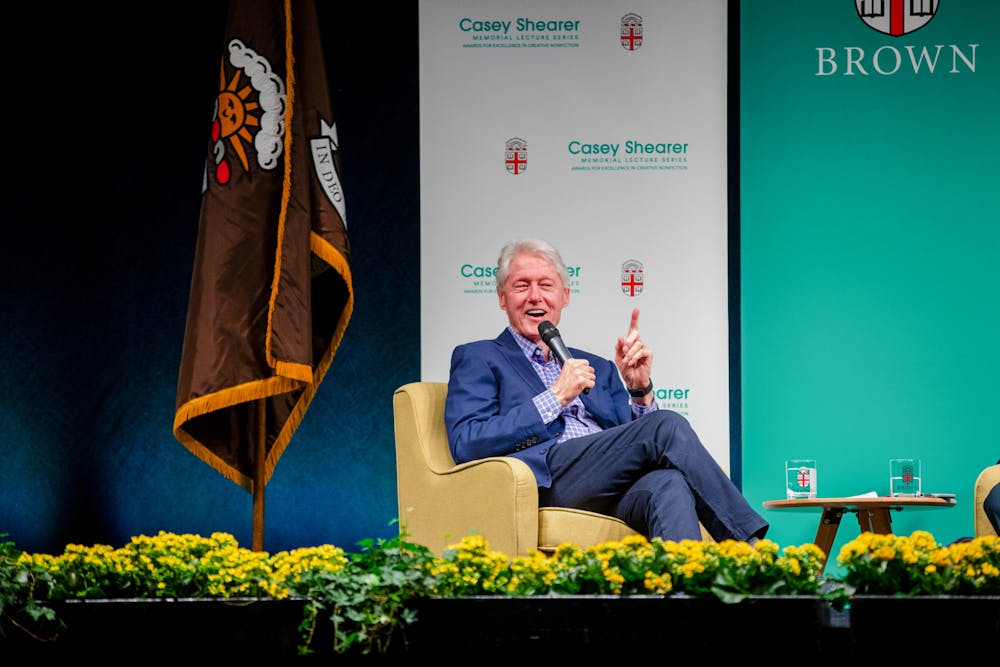Former U.S. President Bill Clinton spoke to the campus community Tuesday afternoon in the 2022 Casey Shearer ’00 Memorial Lecture. The conversation was facilitated by Derek Shearer — professor of diplomacy and world affairs at Occidental College and former U.S. ambassador to Finland — two years after the event’s postponement due to the COVID-19 pandemic.
The event was the largest on campus in more than three years, according to Ruth Goldway, who helped establish the lecture series 20 years ago in honor of her late son Casey.
The lecture began with a brief introduction from University President Christina Paxson P’19, opening remarks from Goldway and memorial remarks from Anthony Yannatta and Julie Yannatta, Shearer’s older siblings. The event then featured a conversation between Clinton and Derek Shearer, Casey Shearer’s father who also helped establish the series. The two spoke about current political issues, Clinton’s personal interests and career advice to future generations.
During the discussion, Clinton addressed the ongoing Russia-Ukraine conflict, stating that he does not know if the West should have done anything differently in the past. He noted that, during his presidential administration, he “spent sleepless nights” weighing the potential benefits of the North Atlantic Treaty Organization but was “criticized.”
“There was a NATO conference in 1997 in Madrid where … we left open the door for other countries to join if they wanted to,” Clinton said. “They had to be a democracy and have a certain amount of military capacity … (for) joint planning and training.”
Clinton noted that he knew that the Baltic states — Estonia, Lithuania and Latvia — would not satisfy those requirements. “They were known as the captive nations, and believe me … they were eager to join NATO. They just weren't ready yet. They hadn't cleared all the hurdles,” he said.
Clinton added that these countries were accepted into NATO in the following years.
Clinton pointed to the meetings he had with Soviet leaders during his presidency as a response to critics who have said that his administration caused the current conflict in Ukraine and “alienated the Russians and made them feel small.”
“In the eight years that I served, I met with Boris Yeltsin 18 times and Vladimir Putin five times,” he said. “The idea that we were trying to jam Russia or isolate them … was just not true.”
The conversation then moved to Clinton’s views on China’s position in global politics. “My theory was always (that) we should work for the best and prepare for the worst,” Clinton said. To critics of his harsh foreign policy toward China, Clinton said he aimed “to keep America from sticking its neck out on cooperation and … not being able to do anything to defend themselves.”
After discussing global politics, Clinton discussed some of his hobbies, such as his passion for playing the saxophone and solving New York Times word puzzles.
Derek Shearer then asked Clinton to give advice for students who are considering a career in politics. While Clinton said he has regrets about pursuing politics, he noted that he would have had regrets in any other career he chose. He noted that in order to have a successful political career, individuals need to have a “very high pain threshold” and be able to take criticism seriously rather than personally.
Clinton added that he would encourage the next generation to take risks. “The unhappiest people at my high school reunion are not the people who have gone bankrupt, lost elections, been beat up (or) had terrible things happen,” he said. “The unhappiest people are the people who were afraid to try what they wanted to do in their lives.”
The conversation ended with a discussion on climate change, and Clinton called for greater action in confronting the impending crisis. “Does anybody believe we are going to make it a million years the way we are going?” he asked.
Student attendees had mixed reactions to Clinton’s speech.
“I found his thoughts on his meetings with Presidents Yeltsin and Putin fascinating,” Francisco Cerda ’24, who attended the lecture, wrote in an email to The Herald. “It highlighted how events can be often predictable yet simultaneously unstoppable like Putin's regime in Russia.”
Edan Larkin ’23, president of Brown Democrats, wrote in an email to The Herald that despite disagreeing with Clinton’s politics, she attended the lecture because she was “interested in hearing from whichever elected officials Brown brings to campus.” While Larkin appreciated Clinton’s advice for those interested in politics, she noted that she disliked “how he downplayed his wrongdoings.”
The popularity of this year’s event also brought challenges for the event’s organizers, according to Elizabeth Rush, assistant professor of the practice of English and an organizer of the lecture series.
“The day that we made the announcement we sold out of tickets, so we decided to move the event to Pizzitola Sports Center to accommodate more people,” Rush wrote in an email to The Herald. Changing the location resulted in logistical challenges and was “not a small feat,” Rush wrote. But, according to Rush, the extra work was worth it. During the event, the 2022 Casey Shearer Memorial Awards were distributed to first-place winner Michelle Liu ’22 and second-place winner Henry Block ’22.5 for their short stories in creative nonfiction.
The lecture was part of the Casey Shearer Memorial Lecture Series, which was created to commemorate Casey Shearer ’00, an economics concentrator with a passion for sports journalism and creative nonfiction who passed away days before his graduation. Clinton previously gave a speech on campus in 2000 as the first lecture of the series, created by Shearer’s parents to do “something in his honor,” according to Elizabeth Taylor, distinguished senior lecturer emerita of English, who was one of Shearer’s instructors.





